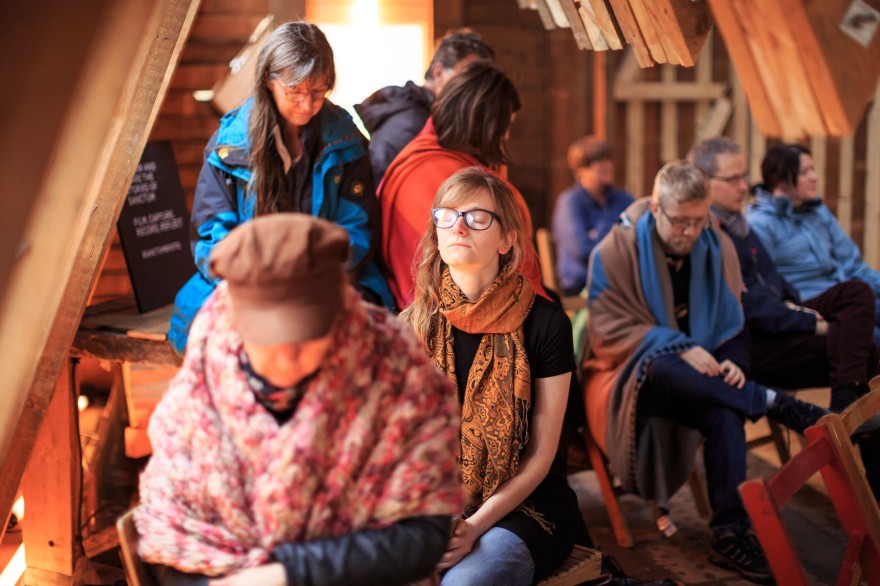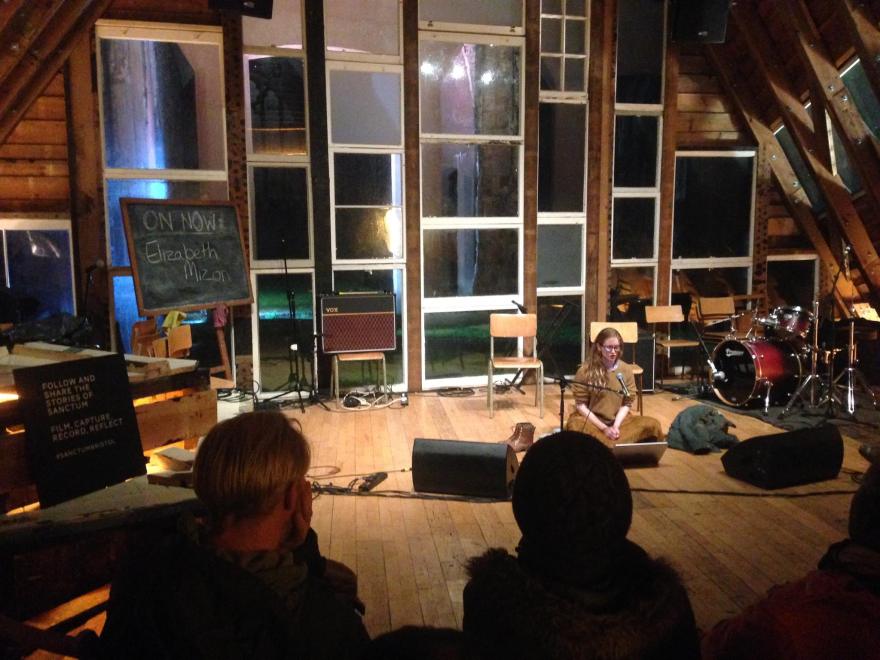Adverts can be some of the most truly sophisticated films. Little tiny complex stories. Whether infomercials for hardware shops or questionably abstract perfume adverts, they function in the same manner any ‘film’ does: to deliver and elicit emotion. I love them.
Even when the creatives making them scratch at the surface of our collective misery, and smear the bits from under their fingernails onto a banner that they relentlessly hold at us, like an industrial Westboro Baptist Church.
Apple’s new advert takes that concept and dances with it, in a genuinely wonderful piece of art about the power of the imagination and the lackluster reality of a young worker’s life. That same piece of art asks us to spend £319 on a product that, finally, replaces the strenuous activity of having to open Spotify yourself.
What’s this story about? The official reading is that a young woman who is having a crap day, comes home from her drudge job to a depressingly modest flat. On request, her Siri-imbued Apple HomePod plays her something she likes, and through the emotive nature of music, her world is transformed for a blissful minute.
What very few have read is: a young, employed WOC, with a quite beautiful, personalised and furnished, spacious flat, is depressed. The grey colour grade tells me that, and rain + commute = she lives in London. We don’t know what her job is, but with this kind of flat she’s gotta work in finance or arms dealing. She’s contemplating the ethics of working for an industry that exploits and destroys in rote fashion. (Maybe she works for Apple?)
She tweeted something well-meaning about Syria earlier, and was trolled by both alt-left and alt-right bots who sent rape threats, and links to videos of children being harmed. She hasn’t seen her family in a long time. Instead of engaging with this, it’s easier to lose herself in the £319 button-pressing-replacement that is constantly harvesting her data, which may in the future be sold to an authoritarian crypto-state run by alt-wing trolls. (The same ones that contacted her today, ironyyyyy!)
It’s a cynical cash-grab, exquisitely executed. Apple is slick in its attempt to convince us that it’s on ‘our side’ regarding the drudgery of neoliberal life, rather than a direct contributor to it in a far more complex and pernicious way than it would ever dare reflect in its colourful, heart-string plucking brand personality.
Squinting at the relentlessly bright Westboro-esque signage of the art-vert, our response is: “…how come we can’t see the film crew in the mirror? Amazing.”
—
Real Film Director Spike Jonze (Her, Adaptation, Being John Malkovich) made his name in the field of ‘non-film films’ – skate videos, music videos, adverts – in the ’90s. His work has pushed the vanguard of filmmaking technique and narrative, allowing him to straddle status as both a mainstream and cult darling.
I love his work, as much as I ‘love’ the MacBook I’m writing this on – formally, they are excellent products, technically impressive, and full of the ghosts of the Apple/Foxconn factory suicide nets.
All of which leaves me with this confused sadness, asking: “How do I marry my status as a consumer with the effects of the industries I buy into?” and “Whoa. How much did the stretchy set cost? Mental.”
Plenty of ‘film directors’ have taken the commercial reins, to make genuinely excellent little films that sell products for companies. Who can forget Edgar Wright’s Pizza Hut advert from the year 2000, featuring Nick Frost and stuttering Billy from Spaced Season 2 Ep 3?
Or American History X director Tony Kaye’s phenomenal piece of advertising work, ‘Tested for the Unexpected’. This dystopian, dream-like terrain features a nipple-pierced, silvery-Buddha antagonist, a grand piano chucked off a bridge, and a 2-second long shot of four elaborately-costumed amphibian creatures grasping around a pool of water for no reason. All this to persuade us, specifically, to buy tyres from Dunlop.
Spike Jonze’s last entry into the commercial market was, loosely, the best thing I’ve ever seen. THIS is how you do a perfume advert:
Edgar Wright’s pizza-lovers spot begins in some sort of group therapy setting. Kenzo’s unnamed woman (actress [and excellent dancer!] Margaret Qualley) is tearful and alone, trapped in the squashed formality of some elite celebration.
And FKA Twigs is, I guess, supposedly ‘one of us’, i.e. from Apple’s target market: a depressed precariat/emergent service worker who can afford a £319 talking speaker on credit, if it will take away her pain for the length of a flagship advert for the world’s wealthiest company.
My next question is: if ‘Welcome Home’ was an FKA Twigs music video rather than an advert, it likely wouldn’t occur to me to be as dismissive. But a music video is still selling something. A song download, an album, concert tickets.
—
A lot of people, especially young and/or disenfranchised people, are drowning in great lakes of misery. Both individuals and society at large are struggling to understand exactly how to get out of this seemingly ever-worsening epidemic, because depression and anxiety – unlike some other medical issues – are simultaneously undeniably-individual-and-rhizomatic, yet also fostered by a social, situational and global environment.
As an individual I might be able to control my depression by going running, and increasing my individual share of endorphins. I can’t control the illegal levels of pollution in my city that, often, I can literally taste in the air as I gasp it down.
I might be able to finally break away from my partner who beats and emotionally abuses me. I can’t control the fact that when they continue to contact and threaten me, the police fail to deal with it and the refuge services that used to be government funded are no longer.
I might be able to lose myself in art, and imagine myself infinitely expanding the walls of my tiny, moldy, variously-broken flat. I can’t get hold of my landlord, and I don’t have time to see my friends, who I struggle to communicate with on a meaningful level anyway. I’m scared to go to work, as I’m often bullied by my colleagues – just slightly less than I’m scared to be unemployed again.
Misery. Isn’t art an ideal place to express it? And don’t these star directors and the phenomenally talented crews they work with re-present it to consumers so well? And should Apple, who make more than $1bn a week, and avoid tax, and perpetrate abuse of outsourced workers, use our misery to sell us sentient speakers?
—
Rhett Jones at Gizmodo describes ‘Welcome Home’ as a “pseudo-prequel” to Her. In a sea of hot-takes titled “WATCH Spike Jonze’s amazing new advert for Apple because it’s enjoyable and you want to enjoy don’t you”, he notes the similarities between Jonze’s feature-length study of satirical tech-dystopia, and the rather more real, less considered version in today’s advertisement. “Today,” he says, “we just want tech to give us a little serotonin burst that makes us forget about the state of our lives.”
This little seratonin burst is advertising’s bread and butter. The worst offender, the one that makes me Very Fucking Angry, is Unilever. I wrote about this ad when it came out in 2013, and the cognitive dissonance it produces. The skill of its technique and form worked on me – insofar as it made me cry – but I was as furious as I was sad. Yes, the world is jumping off a series of cliffs. No, buying your margarine won’t fix it, nor will your “global campaign” that consists of hashtagging #ProjectSunlight each time that you meet with Fergie from Black Eyed Peas.
In his essay, Dulltopia, Mark Bould writes that commercial-film dystopias (e.g. Children of Men, The Hunger Games, et al.) are now conceptually rehashed to the point of monotony. To really access a gut-wrenching, newly-meaningful dystopia, one must look to ‘slow cinema’: a mostly-documentary genre consisting of static long takes, meditative staring at people living the industrial processes of their lives.
“If dystopia can no longer gain sufficient distance from our own world to generate the cognitive estrangement upon which [Science Fiction]’s political potential hinges, we should not look to the future or to alternate words. We should, for the present, stick with the present. We just need to go deeper. To dive into boredom. […] Slow cinema casts us adrift, and upon our own resources”.
In other words, look around you. Stay there. Don’t stop looking.
No, put Candy Crush Soda down. Start again.
Look around you. Stay there. Don’t stop looking.
Keep looking. What do you see? What do you feel?
Is the dread creeping in yet?
—
Johann Hari’s recent book Lost Connections talks about Western-cultural causes of depression. It’s kind of frustrating in that he talks about the biopsychosocial model of depression as if it’s a new thing he just discovered, sort of like how I’m currently going “oh advertising plays on our emotions to sell us things, no freakin’ way!” But it’s an interesting read with that in mind. Dean Burnett has written a couple of useful counterpoints to Hari’s method of promoting his astonishing revelation that depression isn’t created in a vacuum (celebrity endorsements, heavy narrative styling, ginormous marketing campaign), and the two men have since devolved into bickering about it on Twitter.
If these adverts make you feel more miserable or leave you feeling cold, it makes sense. Don’t worry. “It is no measure of health to be well-adjusted to a sick society,” and all that.
Don’t give up. And keep that £319 for when your country ‘unexpectedly’ freezes over and your pipes burst. Or you get pregnant, and need to feed your child when your boss ‘lets you go’ – totally unrelated, you understand. Basically, you don’t need a HomePod.
(Also has anyone noticed that they owe Paul Smith some sort of concept/finders fee?)










